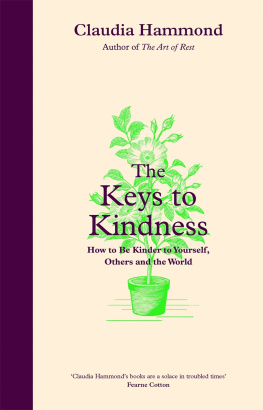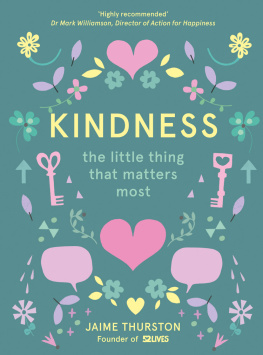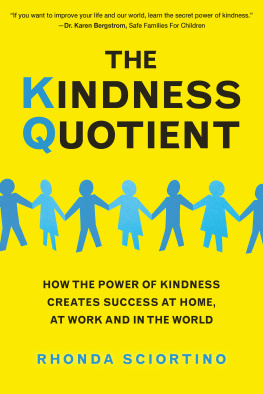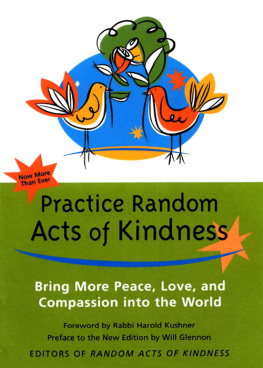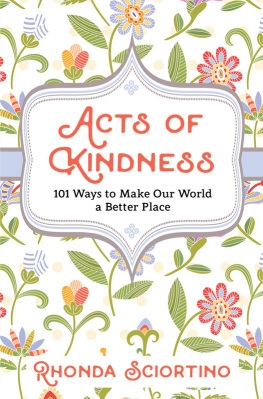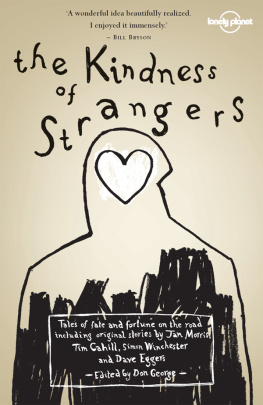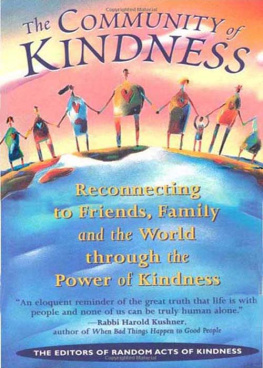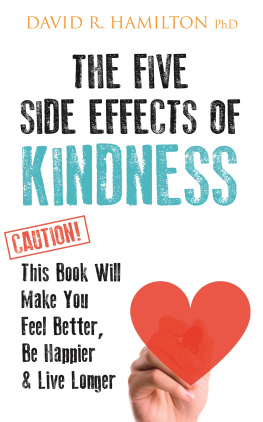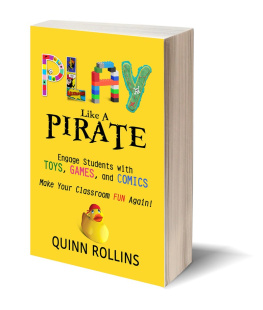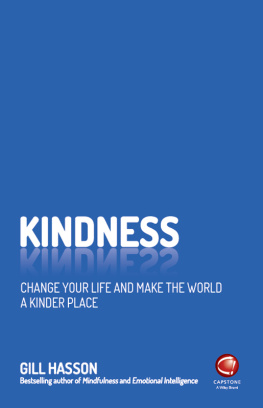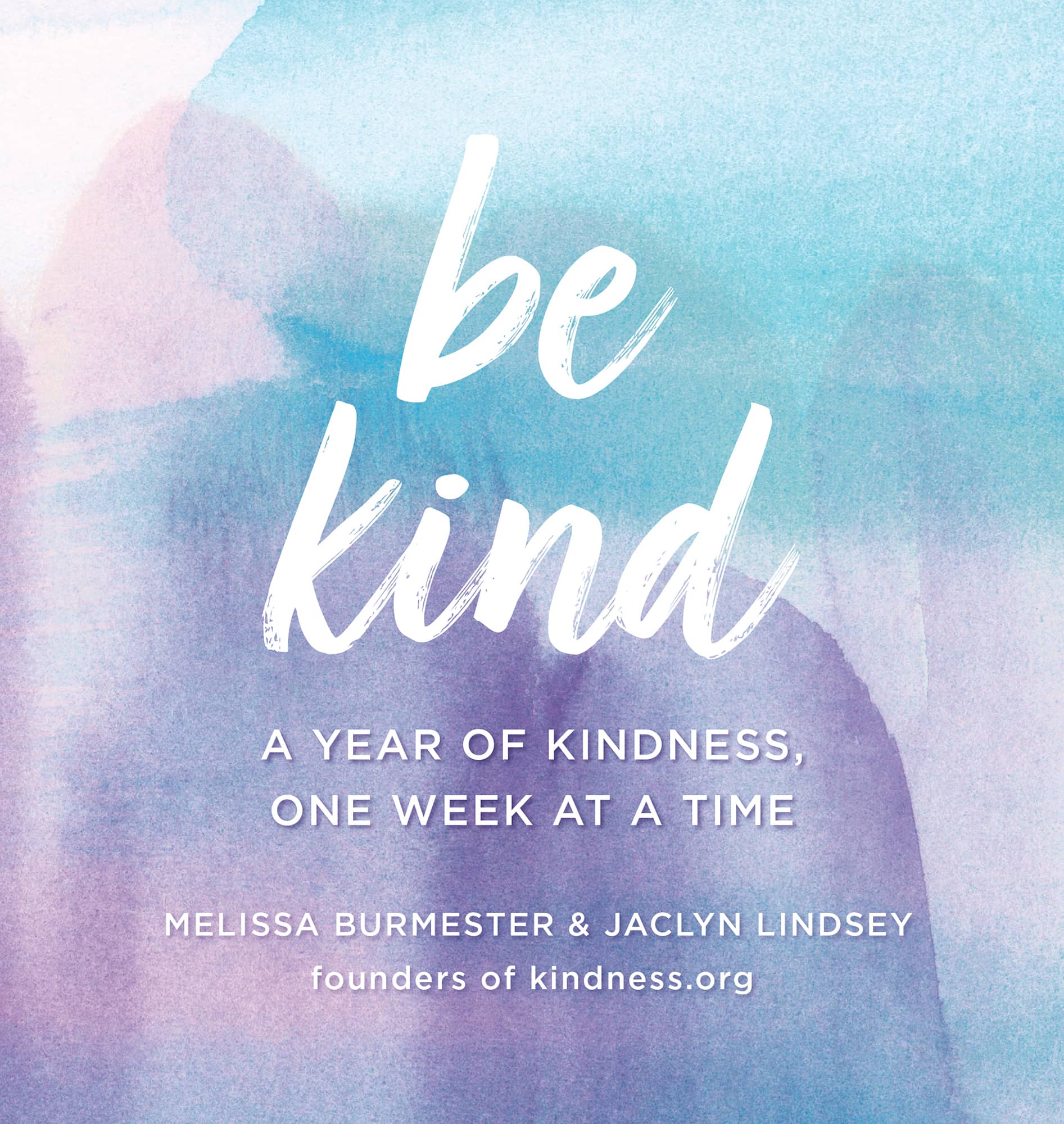be kind
A YEAR OF KINDNESS, ONE WEEK AT A TIME
MELISSA BURMESTER & JACLYN LINDSEY founders of kindess.org

Together, our ripples of kindness can create massive waves of change.
KINDNESS.ORG
Foreword > THE SCIENCE OF KINDNESS
What is kindness? Why are people kind? What are the different types of kindness? How does kindness contribute to a happy and fulfilling life? And how can we make the world a kinder place?
In recent years, science has made immense progress in answering these questionsand our goal at Kindlab, the research hub for kindness.org, is to take the science further still.
Humans are kind because we are an intensely social species. We have lived in social groups for the past fifty million years, and throughout this time we have relied on cooperative relationships with others in order to survive and thrive. Kindness is a way of kick-starting and maintaining these relationships. Thus, we can explain why people are kind to their families, friends, spouses, community members, and even strangers. We can explain why kindness comes in many formsincluding love, loyalty, camaraderie, compassion, reciprocity, respect, generosity, gratitude, fairness, forgiveness, heroism, and humility. We can explain why we find investing in these relationships rewarding, and why helping others makes us happy. And we can explain why most people are kind most of the time.
Most people, most of the time, but not everyone, always. What stops people from being kinder? There are many reasons. For example, some people lack the incentivethey dont care or dont see the point. Some people lack informationthey would like to help, but they dont know what to do, or worry about what might happen if they get it wrong. And some people feel isolatedthey would like to help, but they dont want to act alone for fear their efforts will be wasted.
Kindlab uses the latest insights from the science of kindnessthe biological underpinnings, the psychological circuitry, and the social conditions that foster itto design more effective interventions and programs for cultivating kindness at scale. We help people overcome these obstacles and make it easier for them to choose kindness.
To provide additional incentives, we use techniques from experimental psychology to measure the costs and benefits of kindness, and to show how even apparently insignificant acts of kindness can have a big impact.
To provide the missing information, we curate ideas for how to be kind and subject them to rigorous real-world testing by our citizen scientists.
And to overcome the feeling of isolation, our online community creates the common knowledge needed to reassure people that they are not acting alone, that their efforts are not futile, that they are appreciated, and that by acting together, they can achieve more than acting alone.
So, enjoy the science and stories presented in Be Kind, and join us in making the world a kinder place!
Dr. Oliver Scott Curry, RESEARCH DIRECTOR AT KINDNESS.ORG
Introduction
We never dreamed this is what wed be doing when we grew up, yet, its clear in retrospect that this is always where both our paths would lead.
JACLYN
I tell people Im a Florida girl. Even though Brooklyn has been my home for eight years, my heart belongs to the beach. Its where I feel most whole. Its where I was raised, part of a big, beautifully blended family that includes seven full, half-, and step-siblings. My brothers, sisters, and I learned about the power of generosity from our parents at an early age. Like many childhoods, there were good days and bad, but I most cling to the memories that give me what feels like a DNA-deep passion for helping people.
A few years ago, while at a crossroads of life and career, struggling with what to do next, I went to where I feel most comfortable and sat on a beach. I listened to the waves of wisdom and prayerfully asked what my personal mission waswhat difference could I make each day? Inspire Kindness and Generosity is what materialized onto the pages of my journal. It was not exactly the clarity I was looking for, and yet, it was the most obvious answer I could have been given. Having grappled with bullying, self-esteem issues, and drug abuse, and ultimately finding a belief system that saved me, I had been filled with a deep conviction that at our core, kindness was something that could connect us all. I wanted more of it for myself, and I wanted it for the world. I wanted it because it felt like the clearest language of my personal faith that I could fully understand and speak to others.
Little did I know, and Id soon discover, that this was a word that was bubbling to the top for so many people around me. There was one person who would soon become more than just a friend and colleague I saw every so often, but my co-founder on this journey.
MELISSA
I tell people that I am still a work in progress. Hah! When I landed on the focus of kindness, I was coming out of a season of self-reflection and facing the realization that I needed to make some changes in my life.
My mom says she worried about me when I was little because I was too sweetif there werent enough chairs at a table, I was the one without one. And then one day when I was in first grade, she found me after school, hands on hips, standing protectively in front of a neighborhood girl who was being bullied by a group of older kids. I dont care what you say about her, she is my friend! I declared. My mom was a little less worried after thatshe saw my strength. Kindness no matter the personal cost, I do think thats who I was as a kid. But as I grew older and moved through my career, I lost that part of myself.
I became the typical busy New Yorker who didnt talk to my neighbors or make eye contact in the streets. I was prioritizing results over people at work, and work over friends. I didnt answer the phone enough when my family called. The empathy was still there, but I wasnt making the time to act on it.
Years later, I was burnt-out. My dads health was in decline, and I felt like there were decisions and daily micro-actions that I was getting wrong. Something had to change. After a lot of thought, I had a direction (that I had yet to say out loud to anyone): I was ready to leave my job and no matter what I did next, I wanted to focus on being kind. Coincidentally, Jaclyn was the first person I told. I prefaced it with dont laugh at me because I thought the idea was irrational, having no notion that she had already landed in the same direction.
To be honest, we occasionally get it wrong. Its easy to feel inadequate while leading an organization focused on kindness. But we are committed to keeping at itresearch, practice, mistakes, kind redos, continuous improvement. Kindness is a choice. Learning how to choose kindness more oftenboth when it is easy and when it is hardis now a life mission. If everyone was just 10 percent kinder, how different would our world be?
Our goal for this book is that it will push you just a little bit outside your comfort zone and help you flex your kindness muscle. The scientific facts have all been vetted through Kindlab, the stories are all true (though some of the names have been changed), and the kind act suggestions have been evaluated for their cost and benefit ratio. Our hope is that by the end of the book you come to the same conclusion as us: every kind act matters.


